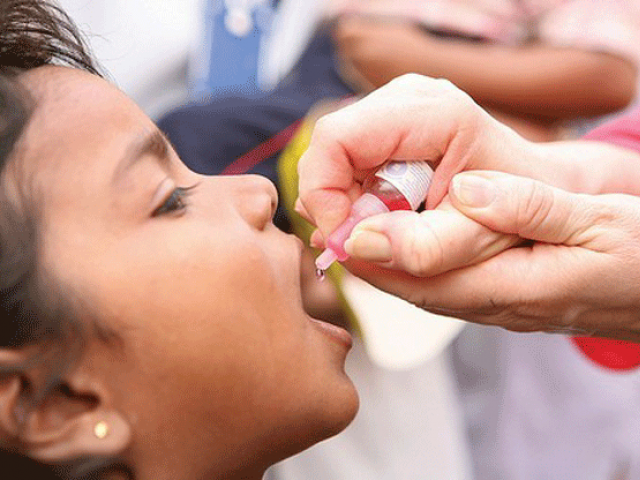IMB appreciates Pakistan’s polio eradication efforts
Board to announce recommendations later in May

PHOTO: REUTERS
The board, comprising of top global experts on polio, had met at the College of Physicians in London on Tuesday to review Pakistan’s polio eradication programme. The meeting was attended by a Pakistani delegation led by State Minister for Health Saira Afzal Tarar and included Prime Minister’s Focal Person On Polio Eradication Senator Ayesha Farooq, National Coordinator Dr Rana Safdar, chief secretary of Balochistan, health secretaries from Punjab, Sindh and Khyber-Pakhtunkhwa and the additional chief secretary of the Federally Administered Tribal Areas (Fata).
Appreciating the commitment of the political and administrative leadership of Pakistan in the fight against polio, the board assessed all the virus transmission intensity and noted that the low transmission rates presented a unique opportunity to rid the world of the crippling disease forever.
US lawmaker assures help for Pakistan in eradicating polio
The meeting reviewed the situation in polio endemic countries including Pakistan, Afghanistan and Nigeria.
It acknowledged the progress in Pakistan made by the dedicated workforce of over 250,000 frontline workers, the people and the polio management team both at national and subnational levels for their commitment, creativity and hard work.
The IMB will be concluding deliberations by the end of this week and will issue recommendations during May.
Addressing the board, Tarar said that the premier had declared polio eradication as one of the top priorities in the health sector in Pakistan and that it was intractably linked to the Sustainable Development Goals and the ‘National Health Vision 2025’.
She said that the programme in the country has been focused on fully implementing a National Emergency Action Plan on polio.
Moreover, to ensure the success of the plan, she said that a performance culture had been consolidated around a drive for results and urgency.
“Our collective efforts have been to ensure the key foundations of the programme are built on solid structures such as the importance of the vaccinator – female, local to the neighbourhood, well trained and well supervised; ensuring good micro-planning across the board; and a high investment in risk management,” she said.
Noting that the 20 polio cases recorded in 2016 were lowest ever recorded in the country, Tarar said that they had tried to build on that momentum, the result of which was that in the first four months of 2017, only two cases had been reported, compared to 11 during the same time period last year.
Moreover, she said that the last cases reported from core reservoirs such as those in Karachi and Khyber-Peshawar had been last reported in early 2016.
Outbreaks in tier-IV districts of Kohistan and southern Sindh have been effectively contained since September, the minister said.
Presenting the country situation report, Farooq stated that their efforts have ensured that the current polio epidemiology in Pakistan remains the best ever seen.
However, the focal person said that interrupting poliovirus circulation and eradication were zero-sum games.
The country team shared details of the activities they had conducted during the low transmission season so far in key risk areas, surveillance as well as the management and oversight.
The results of a recent survey indicating high immunity levels in the highest risk areas were also presented. Details of mechanisms in place to jointly tackle the virus risk in bordering zones with Afghanistan were also presented.
Special eight-day polio campaign to start in K-P
Meanwhile, National Coordinator Dr Safdar termed the IMB deliberations as very reassuring and motivating for the national polio eradication team.
“The [polio] virus is now fighting for its survival. We have to stay focused and only a bit of additional push could help us in achieving a significant global public health landmark,” he stated.
Last year too, the IMB had noted the transformative improvements in the performance of the Pakistan polio eradication programme.
Earlier before the meeting in London from May 2-3, the Global Polio Eradication Initiative (GPEI) had appreciated the progress made by Pakistan in a letter to the IMB.
“Significant progress towards stopping poliovirus transmission, and genetic diversity of the polioviruses detected in the two countries has reached an all-time low,” wrote Michel Zaffran, the director of the World Health Organisation polio eradication programme and chair of the GPEI Strategy Committee.



















COMMENTS
Comments are moderated and generally will be posted if they are on-topic and not abusive.
For more information, please see our Comments FAQ